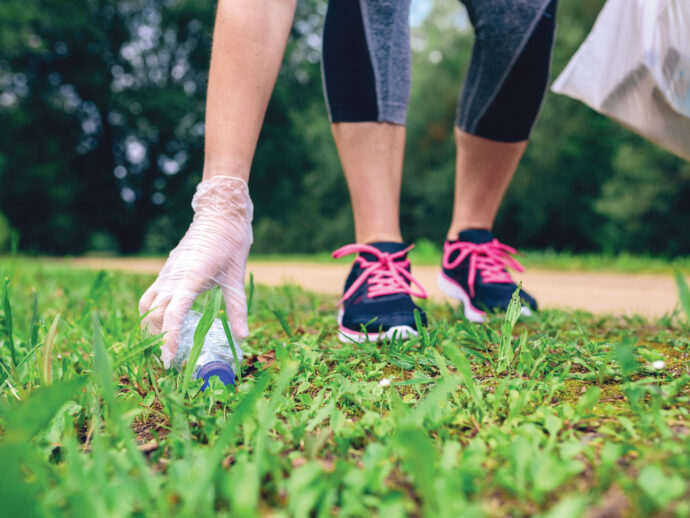
Another great Swedish idea, plogging (a mash-up of the Swedish word plocka, to pick, and jogga, to jog) is taking off across Canada—and around the world. Find out more about this new, environmentally friendly fitness craze.
Joggers get to see the world around them in a way that others may miss, taking in treasures on the ground, such as tiny flowers in fresh bloom or swaths of bright green moss. What lies beneath their pounding feet isn’t all pretty, though: runners routinely come across candy wrappers, disposable coffee cups, tissue and toilet paper, and other crumpled-up trash.
A new fitness craze is combatting this garbage. Called plogging, it involves picking up litter while jogging. The activity originated in Sweden, the term being a mash-up of the Swedish word plocka, which means to pick, and jogga, to jog.
Having caught the attention of the United Nations, with events taking place around the globe this past June for World Environment Day, plogging is fast gaining ground all across Canada.
Plogging in Stratford
Stratford, Ontario’s Dano Fuller, a personal trainer and father of two, learned about plogging via social media. He then went on to start the Plogging Canada Facebook page.
“I’m an avid jogger, and litter has always been something that bothered me,” Fuller says. “My biggest pet peeve growing up was seeing vehicles driving and people throwing their fast-food garbage out the window. I never understood why they just couldn’t set it aside and wait till they got to their destination.
“I felt like it was a great idea to combine … fitness and cleaning the environment as one,” he says. “I even bring my kids out on my journey to help with the fun. It’s always great to get more people involved and aware of the pollution we, as a society, have created. And it’s important to pass that down to our next generation to make this a better, cleaner environment for our kids to grow up in.”
Therein lies the deeper meaning of plogging: while the activity is an efficient, easy, and fun way to clean up our sidewalks, streets, fields, and beaches, it’s also a reminder that, as human beings, we’re all responsible for our environment and our own communities. Although it’s frustrating that some people have no qualms about tossing their trash wherever they please, it doesn’t help if others ignore it and walk (or run) on by.
Fuller notes that you don’t have to be a jogger to plog; it fits in nicely with walks, too. And he reminds that, aside from its environmental impact, rubbish can be harmful to animals.
Plogging in Vancouver
Vancouver-based marine biologist Melanie Knight is keenly aware of the potentially negative (even deadly) effects garbage can have on wildlife—especially sea life, right down to plankton, the ocean’s smallest living organism. Earlier this year, she had been seeking a 30-day challenge for herself associated with the health of the ocean. After a few friends directed her to various plogging posts on Facebook, she knew immediately she would participate—and she has since kept up the practice.
“This is running with a purpose,” Knight says. “As a marine biologist, the issue of plastics and marine debris is important to me, and as a runner, running through the streets, I’m seeing garbage all the time. Plastics carry chemicals, and when they’re in the sun and in sea water, they start to break down, and those chemicals leach into the water. Animals and plankton are exposed. Green sea turtles mostly eat jellyfish, and jellyfish look a lot like plastic bags.”
Knight, who specializes in developing catch-and-release aquariums, put her own stamp on plogging with the hashtag #10minutetidy. She wants to do her part for the planet, but, like other passionate runners, she also yearns for a good workout at a swift clip whenever she has the chance. By dedicating just 10 minutes to diligent debris pick-up each time she’s out for a run, she does both.
Plogging anywhere, anytime!
“With plogging, you don’t need a group, a big production,” Knight says. “You can do it spontaneously, on your own, with your kids, and just pick up garbage as you go. Pollution is a big problem that needs more of our attention on a daily basis.”
Plogging supplies
- gardening or other gloves
- reusable and washable shopping bag, compostable bag, small bucket, or other lightweight receptacle
- tongs or trash pick-up stick or tool (optional)
Cross-country cleaning
Wherever water meets land anywhere in the country, you can organize or participate in the Great Canadian Shoreline Cleanup.
The national conservation initiative of the Vancouver Aquarium and WWF Canada, presented by Loblaw Companies Limited, gives Canadians the chance to care for the environment and protect animals’ natural homes right in their own communities, year-round. Visit shorelinecleanup.ca to find an event taking place near you or to plan one.
Plogging resources
- Facebook: Plogging Canada
- Instagram: #ploggingcanada



































